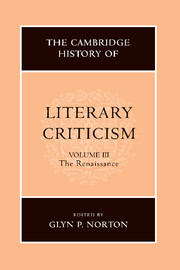Book contents
- Frontmatter
- Introduction
- READING AND INTERPRETATION: AN EMERGING DISCOURSE OF POETICS
- POETICS
- THEORIES OF PROSE FICTION
- CONTEXTS OF CRITICISM: METROPOLITAN CULTURE AND SOCIO-LITERARY ENVIRONMENTS
- VOICES OF DISSENT
- STRUCTURES OF THOUGHT
- 45 Renaissance Neoplatonism
- 46 Cosmography and poetics
- 47 Natural philosophy and the ‘new science’
- 48 Stoicism and Epicureanism: philosophical revival and literary repercussions
- 49 Calvinism and post-Tridentine developments
- 50 Port-Royal and Jansenism
- NEOCLASSICAL ISSUES: BEAUTY, JUDGEMENT, PERSUASION, POLEMICS
- A SURVEY OF NATIONAL DEVELOPMENTS
- Bibliography
- Index
- References
47 - Natural philosophy and the ‘new science’
from STRUCTURES OF THOUGHT
Published online by Cambridge University Press: 28 March 2008
- Frontmatter
- Introduction
- READING AND INTERPRETATION: AN EMERGING DISCOURSE OF POETICS
- POETICS
- THEORIES OF PROSE FICTION
- CONTEXTS OF CRITICISM: METROPOLITAN CULTURE AND SOCIO-LITERARY ENVIRONMENTS
- VOICES OF DISSENT
- STRUCTURES OF THOUGHT
- 45 Renaissance Neoplatonism
- 46 Cosmography and poetics
- 47 Natural philosophy and the ‘new science’
- 48 Stoicism and Epicureanism: philosophical revival and literary repercussions
- 49 Calvinism and post-Tridentine developments
- 50 Port-Royal and Jansenism
- NEOCLASSICAL ISSUES: BEAUTY, JUDGEMENT, PERSUASION, POLEMICS
- A SURVEY OF NATIONAL DEVELOPMENTS
- Bibliography
- Index
- References
Summary
The studies by Marjorie Hope Nicolson, and others, of the impact of the ‘new science’ on seventeenth-century English literature assumed an unproblematic demarcation between science and literature. Since the 1950s this notion has been challenged, both by new trends in ‘literature and science’ (from cyberspace to the rhetoric of science) and by recent historical scholarship. In particular, as this brief sketch will suggest, the historical complexity of the relations between natural philosophy and literature in the early modern period belies not only the traditional assumption of a separate science which ‘influences’ literature, but also the more recent intimations that science simply is literature. In the Renaissance proper (say, until 1630) the methods, goals, and individuals involved in the two clusters of disciplines overlapped in a number of ways. During the seventeenth century new developments in both science and literary criticism tended, sometimes self-consciously, to define the two fields as separate and even opposed. Although one can see in these trends the foundations for our modern sense of a gulf between science and literature, at the time such a gap was not so readily apparent.
Carrying on an ancient tradition, natural philosophy in the Renaissance searched for certain, causal knowledge about nature primarily through the interpretation of and commentary on authoritative texts. Bookish methods promised more exciting results than ever once they could be applied beyond the writings of Aristotle and his scholastic commentators, already central to the medieval curriculum. Thanks to humanism, a vast number of newly discovered ancient works about nature became available: late antique commentaries on Aristotle (for example, Philoponus, Simplicius, and Alexander of Aphrodisias); accounts of pre-Socratic, Epicurean and Stoic, hermetic and Neoplatonic cosmologies and philosophies; and new works and better versions of old ones by still canonical figures, like Aristotle, Ptolemy, and Galen.
- Type
- Chapter
- Information
- The Cambridge History of Literary Criticism , pp. 449 - 457Publisher: Cambridge University PressPrint publication year: 1999



